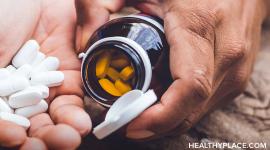Which Medications Cause Depression?

The idea that there are medications that cause depression is surprising to many people, including a lot of doctors. Medication, after all, is supposed to help you feel better, not worse. Sure, prescriptions often carry side-effects that range from mildly annoying to miserable, but a mental health disorder shouldn’t be among them. However, many medications can and do cause depression. Depression caused by medication is called drug-induced depression and is alarmingly prevalent.
A University of Illinois at Chicago study published in 2018 found that more than a third of adults in the United States could be taking medications that can cause depression or increase their suicide risk. That is nearly 110 million people who either have or are at significant risk for drug-induced depression (If you think you may have depression, take our short depression test and share the results with your doctor).
Perhaps this number is so high because of the large number of drugs that have depression as a side effect. Currently, that number is more than 200 (University of Illinois at Chicago, 2018). This encompasses both prescription and over-the-counter (OTC) medications. Knowing the types of medications that can cause depression will help you know the risks of what you’re taking as well as when to watch for depression symptoms.
Types and Classes of Medications That Cause Depression
The medications listed below are general categories of medications. Each group has multiple individual drugs. While not every drug in a given group causes depression, enough do to warrant its inclusion on the list.
This list of depression-inducing drugs can help you make informed decisions when working with your doctor.
- ACE inhibitors (for blood pressure, heart disease)
- Agents to stop smoking
- Allergy and asthma medications (both OTC and prescription)
- Antianxiety drugs
- Anticonvulsants (to control epileptic seizures)
- Antihypertensives (for blood pressure)
- Antivirals (to treat some viral infections)
- Barbiturates (to treat anxiety, prevent seizures)
- Benzodiazepines (for anxiety, insomnia)
- Beta blockers/beta-adrenergic blockers (help high blood pressure, heart failure, angina, abnormal heart rhythms, migraines, anxiety)
- Calcium-channel blockers (to treat chest pain, high blood pressure, congestive heart failure)
- Corticosteroids (to reduce inflammation)
- Dermatologics (for skin conditions)
- Estrogens (for hormone-replacement therapy, menopause, osteoporosis)
- Fluoroquinolone antibiotics (to treat bacterial infections)
- Heart medications not already on this list
- Hormonal birth control medicines
- Opioids (for reducing pain)
- OTC proton pump inhibitors and antacids (for acid reflux, indigestion)
- Statins (to lower cholesterol)
Your risk for depression increases when you take more than one depression-inducing drug.
Polypharmacy is the term for taking more than one prescription drug at once, and when you are on more than one depression-inducing drug, your risk for drug-induced depression increases. Because polypharmacy is vey common in the elderly, they are especially at risk for depression from their medication.
Knowing about the link between medication and depression (a serious mood disorder) can help you prevent or diminish it. Dima Qato, the lead author of the above-mentioned study, summarizes a takeaway from the study:
“With depression as one of the leading causes of disability and increasing national suicide rates, we need to think innovatively about depression as a public health issue…patterns of medication use should be considered in strategies that seek to eliminate, reduce, or minimize the impact of depression on our daily lives.”
Reducing Drug-Induced Depression
The 200 individual medications within the above classes do offer benefits. Whether they’re prescription or OTC, people take them for good reason. Many are life-saving. Therefore, as with any medication and side-effects, it’s important to discuss the benefits and risks with your doctor. Medications are highly individualized as are the reasons for taking them. Keeping or changing medication is evaluated on a case-by-case basis.
Also, perspective is important. While one-third of American adults develop depression as a result of taking a depression-causing medication, two-thirds do not. It’s important to be aware and cautious. Watch for symptoms of depression such as despair, overwhelming sadness, and lack of energy or motivation, and talk to your doctor if you experience them. Because stopping some prescription medications can be dangerous, always work with your doctor regarding anything medication-related.
Many medications can cause depression. By being aware of the side-effects of medications you take and observing your mood and energy levels, you can prevent or reduce this serious mental health effect of some medication.
APA Reference
Peterson, T.
(2021, December 30). Which Medications Cause Depression? , HealthyPlace. Retrieved
on 2026, March 4 from https://www.healthyplace.com/depression/causes/which-medications-cause-depression


